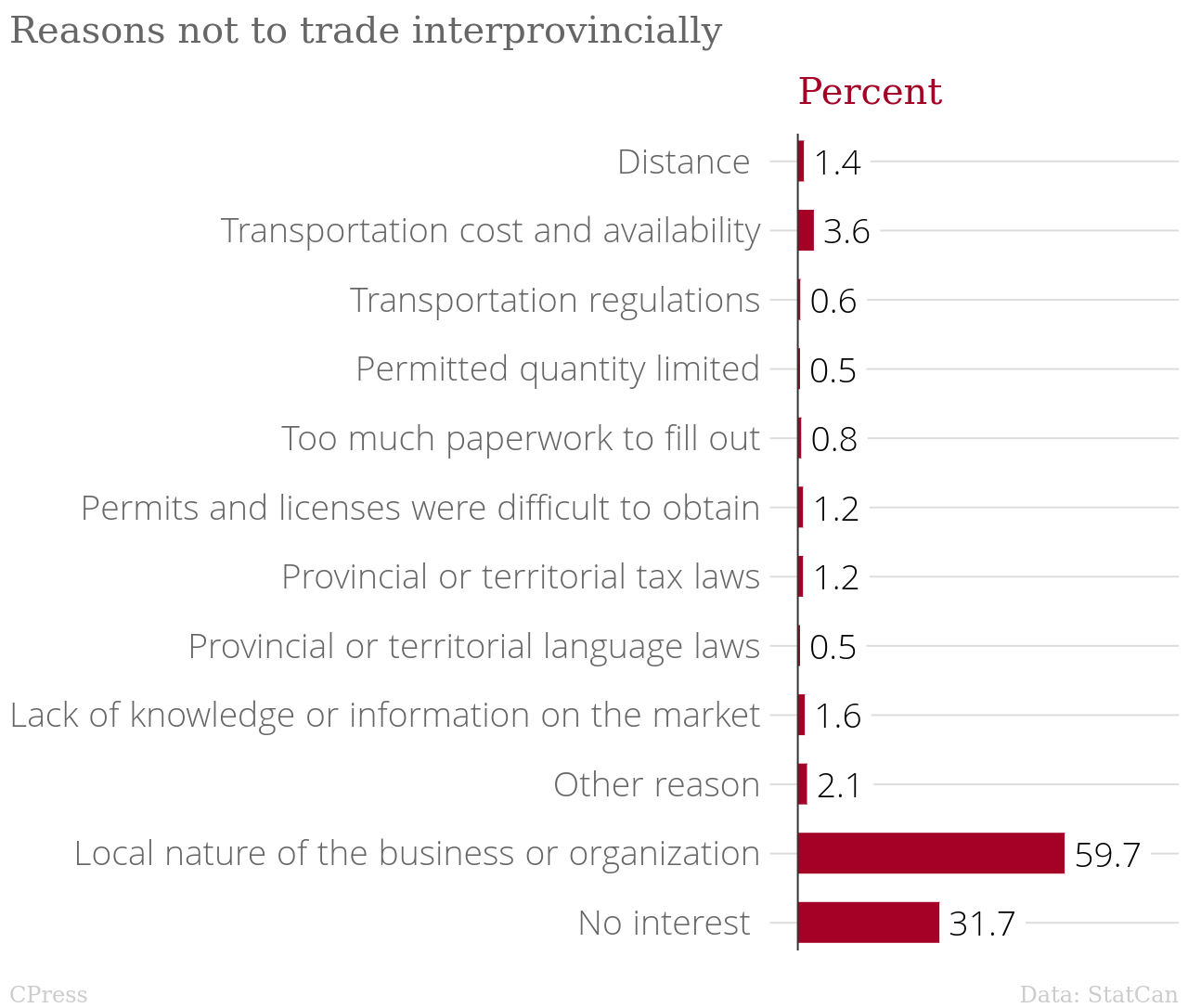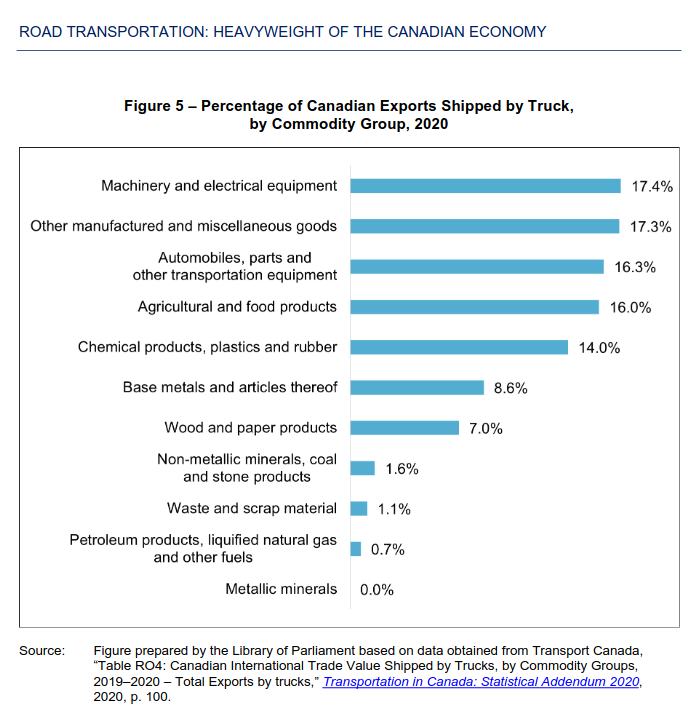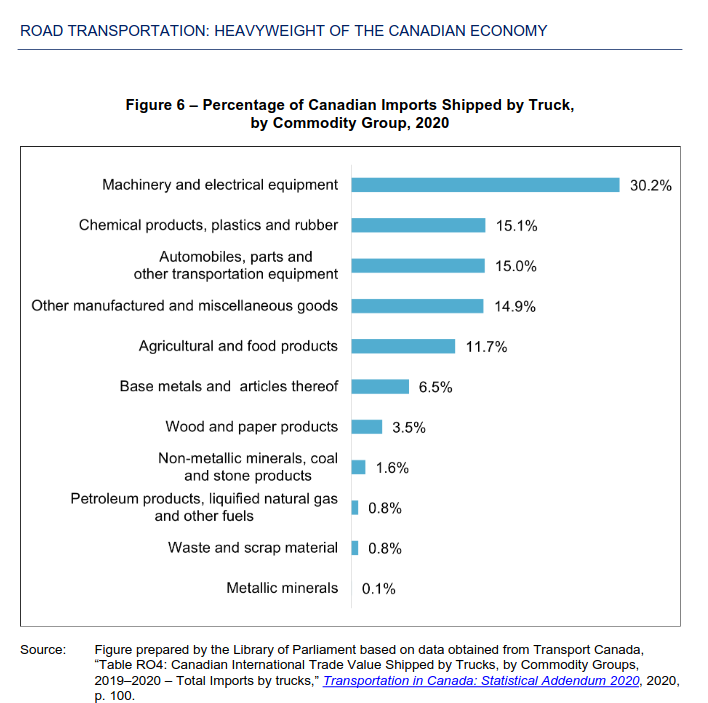Transportation trade issues to consider
Key themes
The need for diversification of export markets
Diversification of exports will require supports from government to build new export capacity including rail, marine, road, ports, and intermodal transport hubs. Raw materials requiring bulk export capacity will also need made in Canada research to ensure quality control, emissions standards, and safety. A procurement program will also have to be altered to support value added production across Canada's long distance supply chains.
The role of public ownership and investment
- There will be a more significant role for public ownership in key sectors to support interruption caused by tariffs, drive investment in sustainable directions, ensure control over strategic transportation infrastructure, and fill-in areas were private investment cannot support an end-to-end commercially viable production supply chain.
- To diversify trade both internally and externally, Canada must look to state-owned and supported transport as part of the production system of our economy, including the movement of people.
- Investments in large infrastructure programs to facilitate efficient public transportation will support jobs and economic growth.
Importance of infrastructure development and East, West, and North trade
- The main obstacle to moving goods East-West-North, according to Statistics Canada's recent study on inter-provincial trade, is the distance and not "regulatory barriers" to trade.
- Deregulating inter-provincial trade rules will not solve these problems of distance and cost of transport.
- Planning travel across different modes of travel in Canada should be made easier through government investment in infrastructure and standardized data platforms for industry and people moving.
- Canada must make investment in shipping, ports, and rail infrastructure.

Supply chain resilience
- Data collection and centralization information on capacity availability for firms to know logistics options for different types of products and where they can be moved would support domestic supply chains.
- Industrial research supporting investment in expanding and securing supply chains will support Canadian commercial activity.
- Increasing speed, diversity of options, resiliency to Canadian weather/climate change, safe, and low-cost options will only come from larger research and data sharing programs.
- Montreal has developed a data hub and app that allows easier planning of travel across the city focused on multi-modal travel, including private car share proving such information can be collected and used effectively.
Labour and worker protections
- Labour protections and unions are crucial for supply chain security and resiliency.
- Wage floors and sectoral bargaining support for delivery and trucking sector can reduce wage suppression and casualization that only supports US company profit growth.
- Workers' rights and unions are entirely missing from current Canadian government supply chain strategies.
- Free and fair collective bargaining help support working conditions and wages needed attract high skilled labour to these sectors and keep money in Canada.
Sector Specific Recommendations
Trucking
Warehousing, trucking, and logistics is a sector that will be heavily impacted by tariffs. Around half of exports to the USA get there by truck and 70% of our imports get to Canada by truck.
Transportation makes up nearly 4% of Canada's GDP, but the employment is much higher than any other large sector by growth.
Trucking and logistics is also the largest single sector employer: 324,000 drivers.


Trucking is also a major source of emissions in Canada:
- 36.7% of transport sector's emissions is trucking
- 8.7% of total GHG emissions in Canada is transportation
And, those emissions have been steadily increasing because there is little in the way of alternatives to diesel and the massive increase in delivery services using light trucks.
Casualization has been a major source of concern for operators/drivers as American companies adjust their tactics to avoid unionization. Because of this, salary drivers have been replaced with usually mis-classified dependent contractors as Owner Operators.
With the ongoing threat to trade, it is important that Owner Operators are not left out of the income supports.
The same regulations that affect fishing boat owners who are owner operators would affect the trucking fleets of who are (misclassified) as dependent contractors.
Additionally to income supports, Canada must ensure that "transport infrastructure" for increased east-west trade discussions include the assets available in trucking.
Logistics
- Ensure Canada Post's logistics infrastructure is sustainable for goods movement in Canada that is independent from foreign investment.
- Electric vehicle procurement and charging infrastructure support for Canada Post to ensure Canadian capacity for logistics industry production.
- Support wage floor and sector bargaining for delivery and trucking.
- Invest in expanded bathroom access support for the logistics industry.
Surveillance technology is mostly designed and developed by Chinese-based or USA-based technology companies. The data from these surveillance and AI is often held in American data centres. Legislation dealing with privacy, surveillance, and AI should be adapted to ensure data on Canadians that is collected meets domestic storage rules.
Emissions standards for cross-border trucking and rail must be examined in the face of trade restrictions. Most of the regulatory harmonization for trucking has been to decrease time and complexity at the border. Much of the freight is flow-through (lands in Canada and shipped to the USA) involving Canadian drivers and owner-operators.
A review of these regulations is likely necessary in the face of tariffs on those goods.
Review the impact on emissions for delivery vehicles used by American companies (Amazon, Walmart) and American logistics services companies operating in Canadian cities.
Heavy competition from subsidized American companies in logistics operating in this space, especially those subcontracting to avoid unionization. Lowering of wages through casualization and shifting to dependent and independent individual drivers as contractors should be viewed as a profit subsidy of these American firms.
As such, the provinces and the federal government should also review the capacity to establishing wage floors for these services.
Charging station build-out
- Build charging stations using Canadian utility-owned programs.
- Support Canadian weather-tested charging stations and buses.
- Support broad adoption of tested technology such as TTC bus charging station.
Rail
Freight and passenger movement by rail is essential for connecting Canada's provinces.
Investment in rail infrastructure to expand capacity for both freight and higher-speed passenger travel will support the East-West-North transport of goods, services, and workers to and from the communities that produce to those who have a need.
East-West oil, gas, and energy products
Rail can move oil products, but capacity along rail routes that do not enter the USA cannot currently fill the full demand for energy feed stocks in Sarnia and Montreal energy systems in the short and medium-terms.
Tank cars, such as the new TC-117 class, that meet new safety specifications would need procuring (and building) along with other commercially viable transport options to avoid the USA.
These transport options must meet new safety standards and at a sustained level of regulation on inspection and maintenance.
Interswitching
Regulations that allow the free movement of American companies along our rail lines through extended interswitching should be cancelled.
Inter-provincial passenger transport
- Address current limits due to underfunding public passenger transport options.
- Short-term public passenger rail solutions involve expanding production of made in Canada transport products supported through government procurement.
- Prioritize infrastructure connecting all modes of passenger transport at central nodes.
- Begin program to build new parallel freight and passenger rail lines.
- Ensure trains, buses, marine, and aviation technology is tested in Canada at NRC facilities before operation and can be maintained and inspected in Canada.
Transport regulatory agencies support
- Support for testing, approving, and regulating new transport technology will be necessary in the face of federal research cuts in the USA.
- Canadian-based rail safety research program is needed.
- Publicly campaign to upgrade all tank car rail cars operating in Canada to the minimum TC-117 standard.
- Establish medium term emissions standards.
Coastguard training and shipbuilding
- Implement coastguard training and recruitment.
- Expand shipbuilding capacity for Coast Guard and northern patrol ships.
Marine communication support
- Provide marine communication support through Telesat development.
- Ferry procurement program for ship maintenance and building.
TODO Rail transport tariff response
- Freight
- Passenger Rail
- Regulations
- Research
- Transport infrastructure and multi-modal travel
- Protecting Canadian production of parts and servicing.
- Labour Rights
- Oil and chemical transport
The need for diversification of export markets
The diversification of Canada's export markets will require the building of new export capacity that connects rail to marine transport, road, and multi-modal transfers, and intermodal hubs.
Raw materials requiring bulk export capacity will also need made in Canada research to ensure quality control, emissions standards, and safety.
A procurement program will also have to be altered to support value added production across Canada's long distance supply chains.
Importance of infrastructure development and East, West, and North trade
The main obstacle to moving goods East-West-North, according to Statistics Canada's recent study on inter-provincial trade, is the distance.

Planning travel across different modes of travel in Canada should be made easier through government investment in infrastructure and standardized data platforms for industry and people moving.
East-West oil, gas, and energy products
Rail can move oil products, but capacity along rail routes that do not enter the USA cannot currently fill the full demand for energy feed stocks in Sarnia and Montreal energy systems in the short and medium-terms.
Tank cars, such as the new TC-117 class, that meet new safety specifications would need building along with other commercially viable transport options to avoid travel through the USA of these products.
These transport options must meet new safety standards and at a sustained level of regulation on inspection and maintenance.
Interswitching
Regulations that allow the free movement of American companies along our rail lines through extended interswitching should be cancelled.
Inter-provincial passenger transport
The government should prioritize public passenger transport options. Short-term public passenger rail solutions involve expanding production of made in Canada transport products supported through government procurement.
Begin program to build new parallel freight and passenger rail lines.
Transport Canada should ensure trains, buses, marine, and aviation technology is tested in Canada at National Research Council facilities before operation and ensure that the new technology can be maintained and inspected in Canada.
The government should build infrastructure connecting all modes of passenger transport at central nodes, coordinated at the provincial level.
Supply chain resilience
The Canadian government should support public transport data collection and centralization on capacity utilization across firms. This is a good opportunity to rebuild in-house capacity and support investment through building resilience across domestic supply chains.
The Canadian transport sector is very dependent on American government research on everything from safety to best practices. With the collapse of the regulatory regime in the USA, the Canadian government must step-in and create made for Canada industrial research to replace what has been lost.
Expanding industrial research in the rail sector will support commercial activity in Canada. Data and smart regulations will increase speed, diversity of options, resiliency to Canadian weather/climate change, safety, and lower-costs only come from larger research and data sharing programs dealing with specific issues faced in the Canadian logistics services.
One example of innovation in the sector lead by government is Montreal's investment in a data hub and app that allows easier planning of travel across the city focused on multi-modal travel. The app connects private car share to the rest of the public infrastructure for passenger movement. Proving information to the public to plan routes and connect passengers to different transport options is essential to expand efficient travel in Canada.
Labour and worker protections
Labour protections and unions are crucial for supply chain security and resiliency.
Laying out a process for setting wage floors, enabling sectoral bargaining, and eliminating mis-classifications issues for delivery and trucking sectors will reduce wage suppression and casualization that only supports large US company profits.
Workers' rights and unions are entirely missing from current Canadian government supply chain strategies. Part of establishing sovereignty over regulations in Canada is about establishing a fair and standard framework for operations in Canada.
Free and fair collective bargaining helps establish the working conditions and wages needed attract high skilled labour to these sectors and keeps money in Canada.
 Marine Road Rail
Marine Road Rail